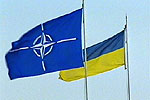Reviewing NATO-Ukraine cooperation on defence and security sector reform
The NATO-Ukraine Joint Working Group on Defence Reform (JWGDR) met at NATO Headquarters on 12 December to review the implementation of key initiatives in 2007 and discuss plans for 2008.

The JWGDR's work programme for 2007-2008 focuses its activities on four key areas: personnel, institutions, civil and democratic control, and issues related to planning, resources and implementation. These are critically important for the success of the comprehensive and systemic approach to defence and security-sector reform that Ukraine is undertaking, as well as for the country's progress towards Euro-Atlantic integration.
Investing in Ukraine's human potential
Top of the agenda was an assessment of the achievements and future challenges of the programme for the professional development of civilian personnel. This programme invests in Ukraine's human potential by aiming to develop a pool of highly qualified civilians working in its security-sector institutions. The programme contributes significantly to supporting the implementation of Ukraine's Euro-Atlantic integration policy, and to strengthening democratic management and oversight of Ukraine's defence and security structures and policies.
Since the programme was launched in 2005, 20 countries have contributed to its implementation. Over 300 officials have participated in some 80 activities, providing over 7000 course days of professional development. The programme has also been extended beyond the Ministry of Defence and the National Security and Defence Council to include the State Security Service and the Foreign Intelligence Service and, possibly, other institutions of Ukraine's security sector.
At the meeting, Allied Nations also announced further contributions in support of the programme including 70,000 EUR of direct financial contributions and various training opportunities for the Ukrainian civilian personnel.
Civil society support for reform
The JWGDR also reviewed progress in implementing the Partnership Network for civil society expertise development since its launch in 2006. The initiative aims to promote the involvement of civil society organizations in supporting the development of security and defence policies and reforms, and monitoring their implementation. Two task forces met in November in Kyiv to look at how to take work forward.
Consideration was also given to how the Geneva Centre for the Democratic Control of Armed Forces (DCAF) could continue to support the JWGDR in assisting Ukraine in implementing defence and security sector reforms. The DCAF has already provided expertise and supported initiatives in the areas of intelligence oversight, civil society development and increasing the parliament's role in security affairs.
Progress in reforms
The Ukrainian delegation provided updates on the ongoing implementation of its National Security Sector Review, since its launch in 2005. They also briefed on progress in implementing wider defence reforms. Overall, good progress is being made and it is likely that the main targets set in the Ukrainian State Programme 2006-2011 are likely to be met, despite shortfalls in the resources allocated. Key initiatives include the activation of a Joint Operations Command, the establishment of the Joint Rapid Reaction Force, the continued drawdown of the force structure, the restructuring of the Ministry of Defence, and the professionalization of the armed forces by 2010.
The JWGDR also discussed ongoing work on reforming the intelligence sector; the status and prospects of reform of both the Ministry of the Interior Troops and the State Border Guard Service; and a Ukrainian request for Allied assistance in conducting a review of the structure of headquarters under the Ministry of Defence.
Possible dates for high-level NATO-Ukraine defence consultations in 2008 were also considered.
